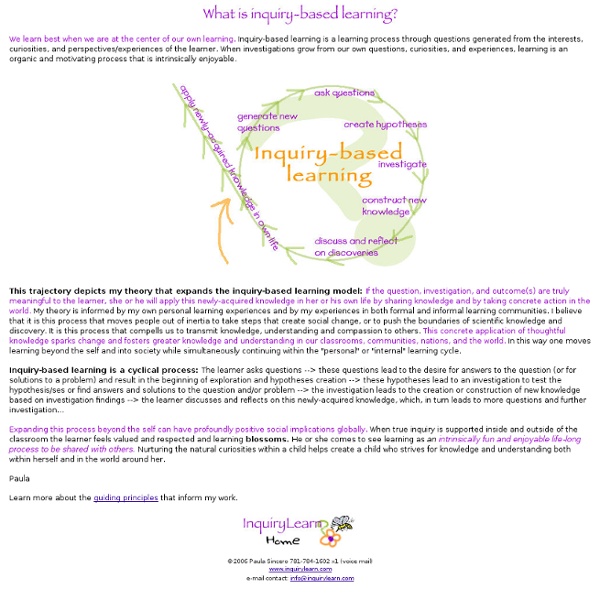What is Inquiry-based Learning?

What is Inquiry Based Learning?
How to Study Help students learn to study well. We offer a number of great resources. View Study Skills Graphic Organizers Great printable graphic organizers for all subjects and grade levels! View Organizers What is Inquiry Based Learning? Inquiry based learning is mainly involving the learner and leading him to understand. Dictionary meaning of Inquiry is seeking knowledge, information, or truth through questioning. Very sadly, our traditional ways of teaching discourage the process of inquiry. Much mesmerizing information and facts are readily available, which needs an understanding of how to make sense out of it and turn it into useful knowledge. Inquiry based learning can be applied on all disciplines which has been confirmed through different researches. The teachers must organize their lesson plans according to the changing, interrelating, and communicating of knowledge. Go Deeper Into Our Inquiry-Based Learning Categories Equity in Education Basics
Inquiry-based Learning: Explanation
What is inquiry-based learning? An old adage states: "Tell me and I forget, show me and I remember, involve me and I understand." The last part of this statement is the essence of inquiry-based learning, says our workshop author Joe Exline 1. Inquiry implies involvement that leads to understanding. Furthermore, involvement in learning implies possessing skills and attitudes that permit you to seek resolutions to questions and issues while you construct new knowledge. "Inquiry" is defined as "a seeking for truth, information, or knowledge -- seeking information by questioning." A Context for Inquiry Unfortunately, our traditional educational system has worked in a way that discourages the natural process of inquiry. Some of the discouragement of our natural inquiry process may come from a lack of understanding about the deeper nature of inquiry-based learning. Importance of Inquiry Memorizing facts and information is not the most important skill in today's world. The Application of Inquiry
The Academy of Inquiry Based Learning
Resources
Useful Sites and Articles I have developed two new companion sites: Web Resources For Inquiry and Apps for Inquiry (Android and i-pad apps) Inquiry-based Learning Galileo Foundation - Sharon Friesen and Pat Clifford. Choose the ‘ICT & Inquiry’ or ‘Integrating Technology’ Links from the top menu bar. The Inquiry Page for info and examples of inquiry. Top of page Resources for Inquiry Top 100 Tools for educators - Ranks 100 ICT tools many of which are free. ng Co.) Graphic Organisers See the Graphic Organisers page Child-friendly Search Engines See the search engines page Useful Sites Inquiry with Technology - My paper on the Opoutere School Digiops project. Student Sites There are large numbers of child-friendly sites on the web, these are a few of my favourites. Iknowthat.com - My all-time favourite site for all topics, not just inquiry. Webquests Dinosaur for a Pet webquest - My dinosaur webquest - I used this with a year 2 - 5 class.
Inquiry Charts (I-Charts)
Grades 3 – 5 | Lesson Plan | Standard Lesson Critical Perspectives: Reading and Writing About Slavery Students critically explore the moral issue of slavery through reading fiction and nonfiction children's literature about the Underground Railroad, and they extend their understanding through creative writing projects. Grades K – 2 | Lesson Plan | Unit Weather: A Journey in Nonfiction Questions about weather clear up when students use what they learned from their books to create a presentation to share with the rest of the class. Grades K – 2 | Lesson Plan | Standard Lesson Adventures in Nonfiction: A Guided Inquiry Journey Students are guided through an informal exploration of nonfiction texts and child-oriented Websites, learning browsing and skimming techniques for the purpose of gathering interesting information. Investigating Animals: Using Nonfiction for Inquiry-based Research Grades 6 – 8 | Lesson Plan | Standard Lesson Inquiry on the Internet: Evaluating Web Pages for a Class Collection
Related:
Related:



